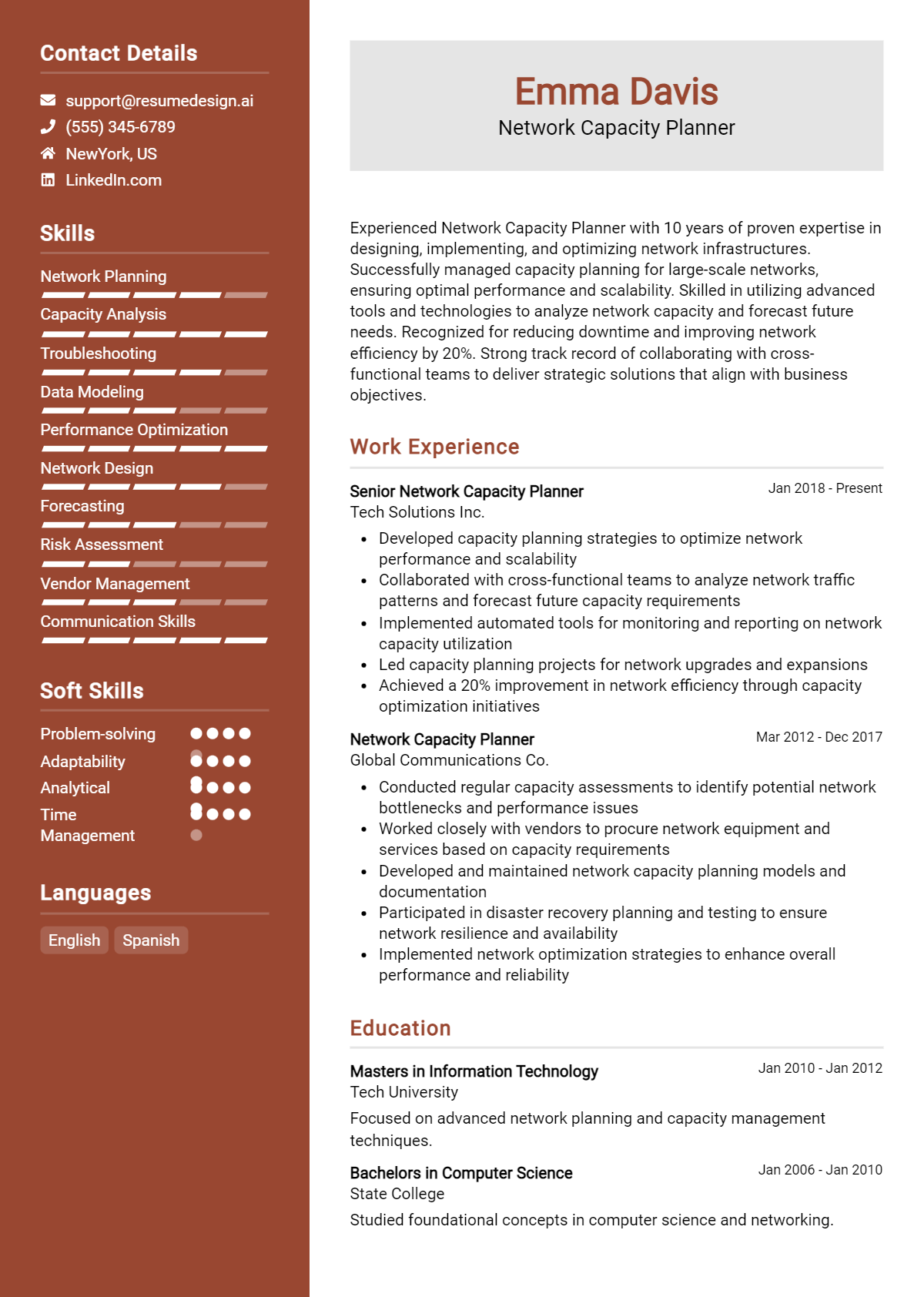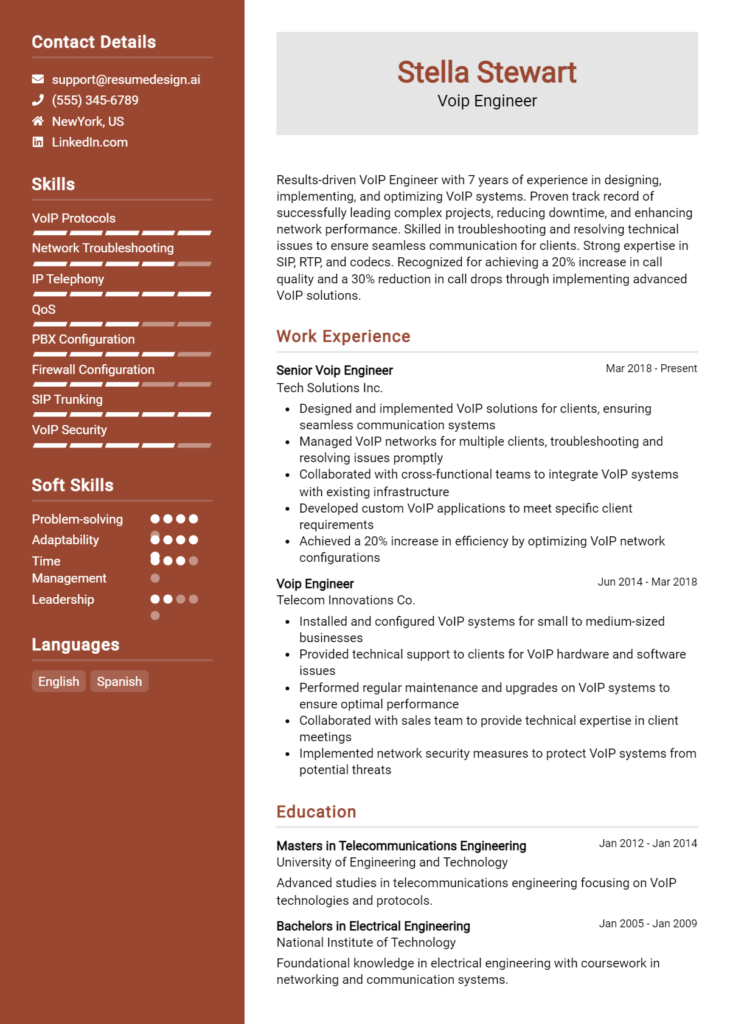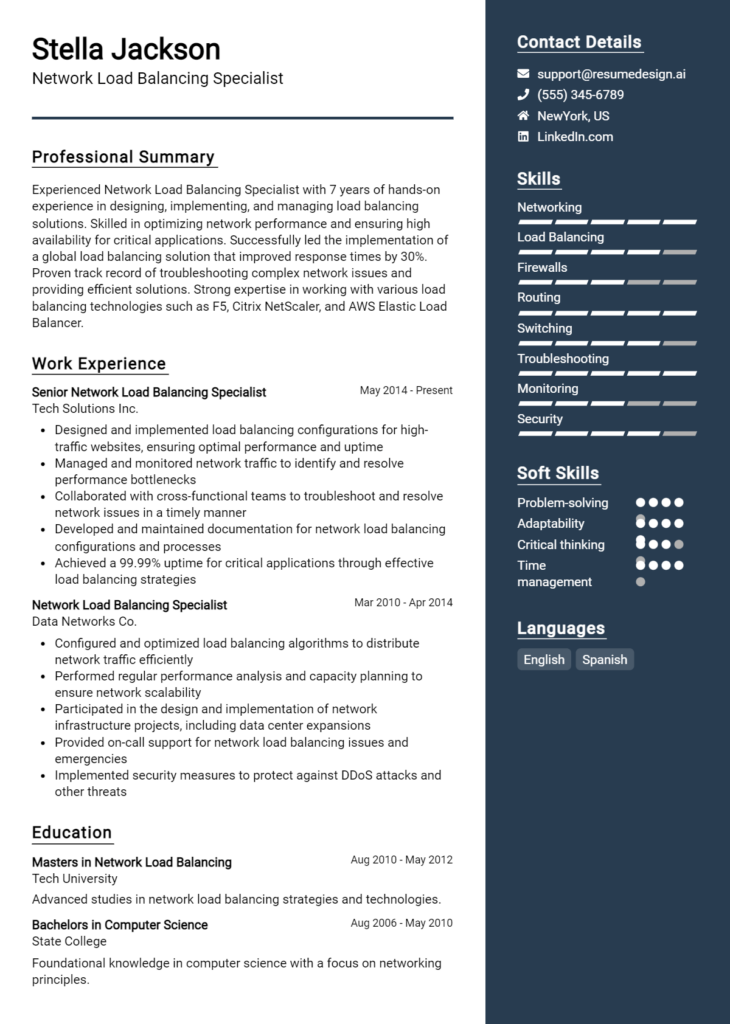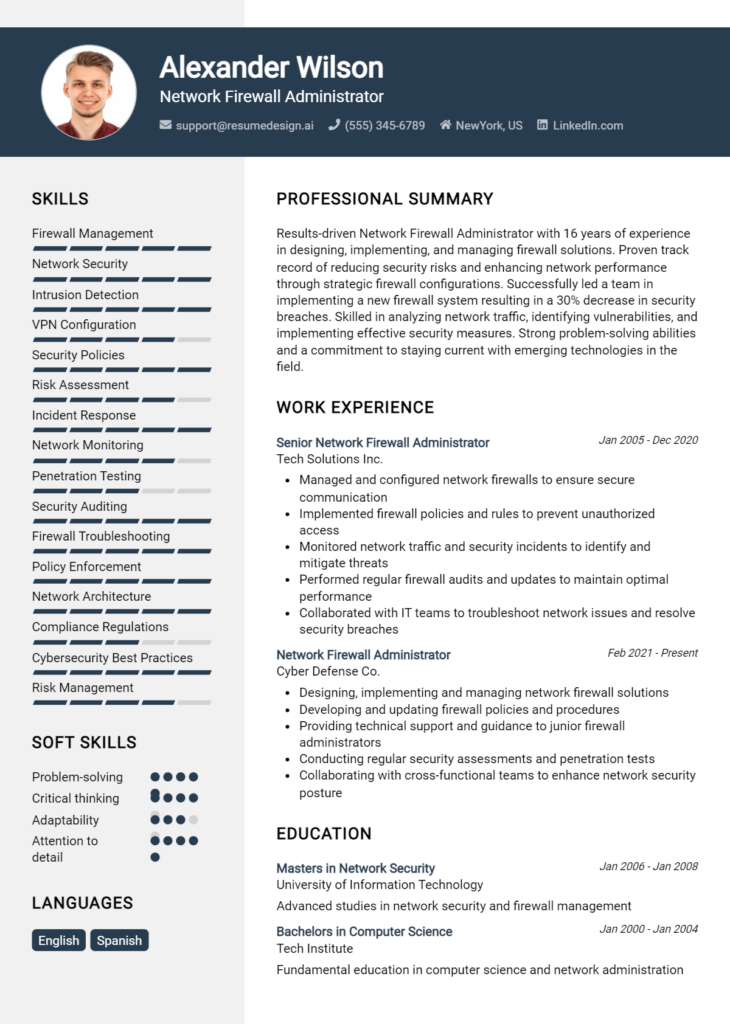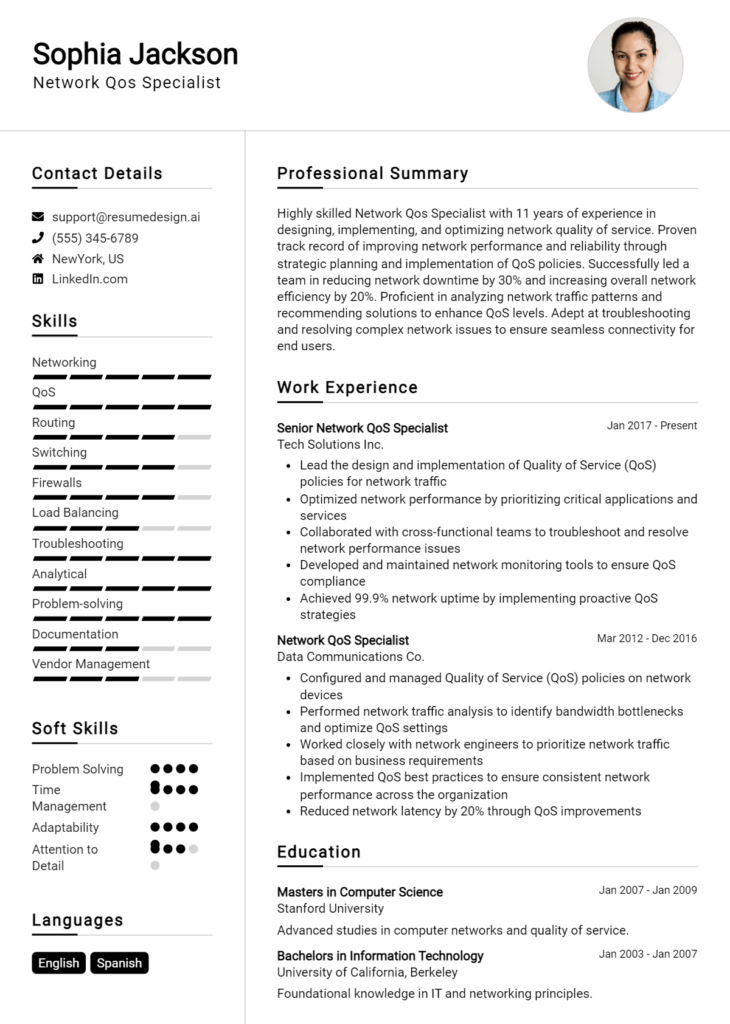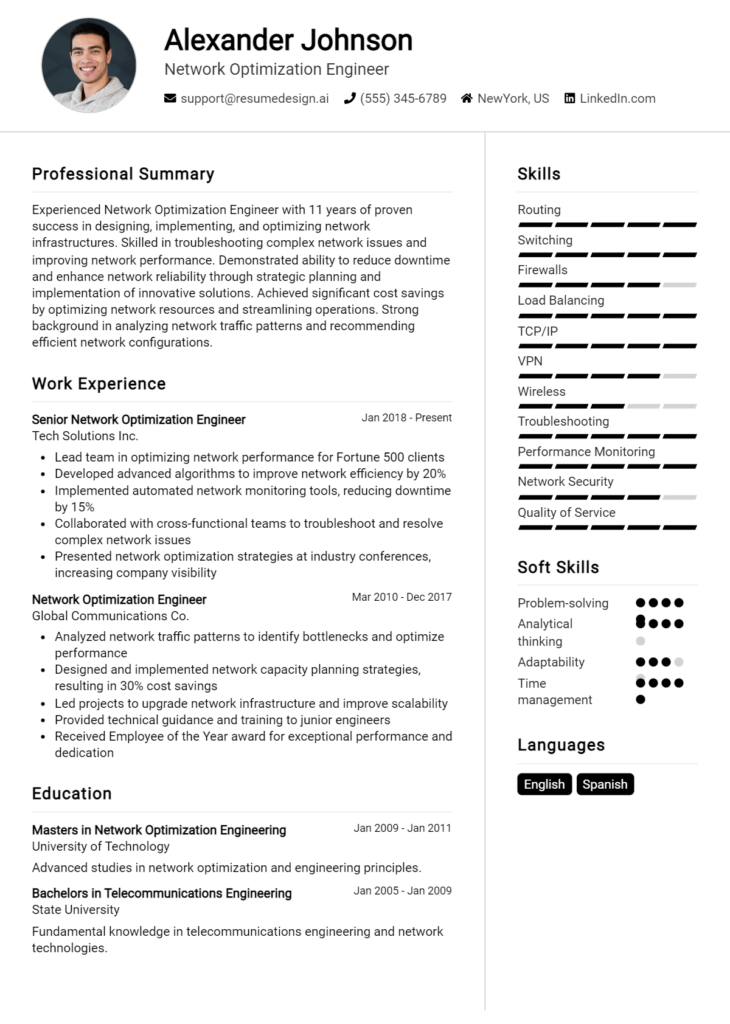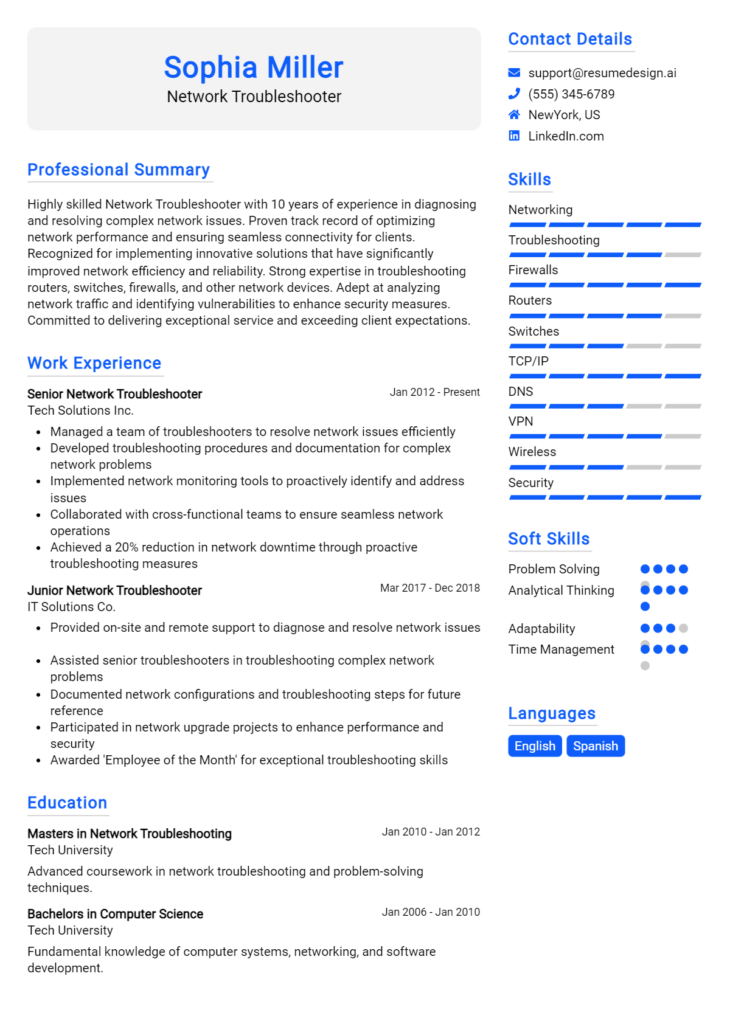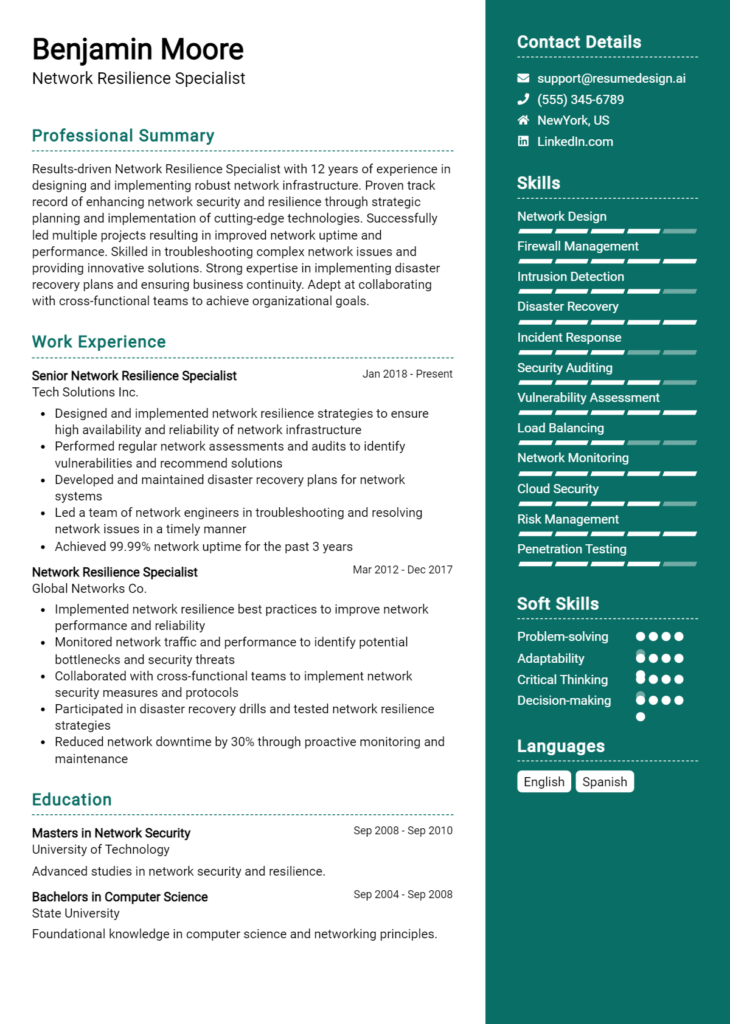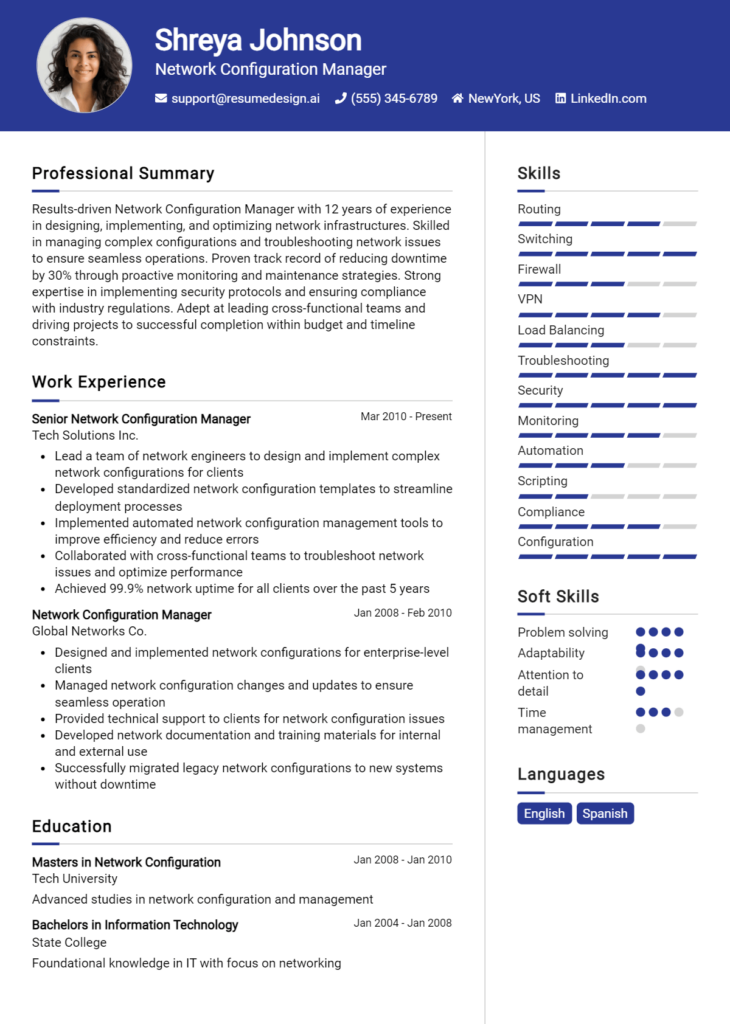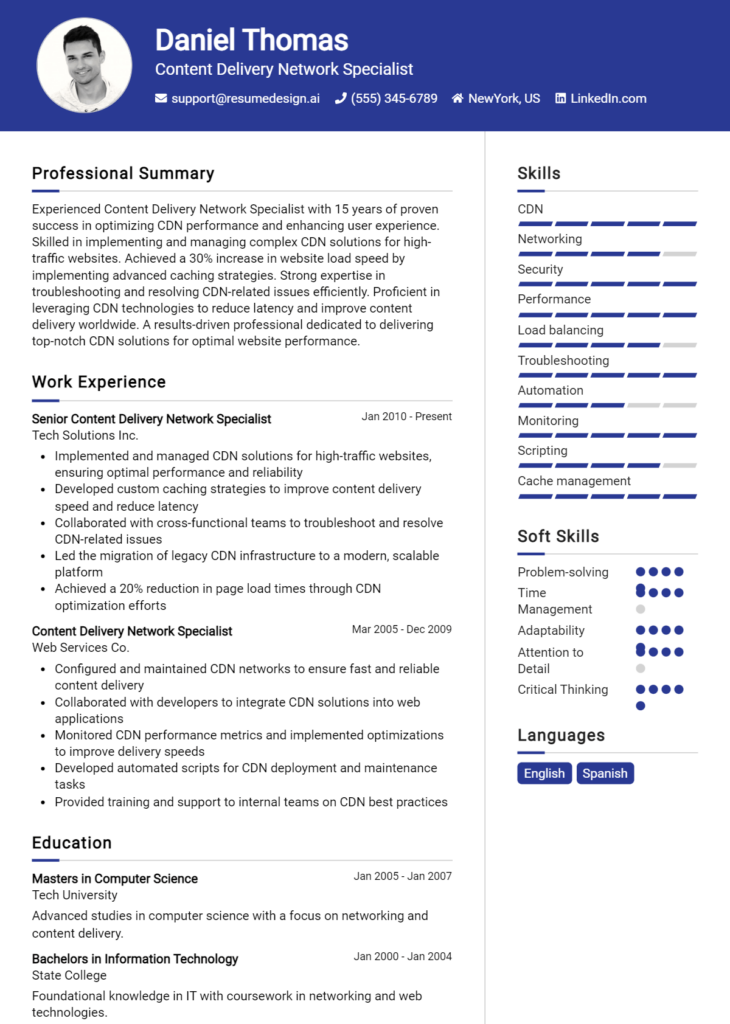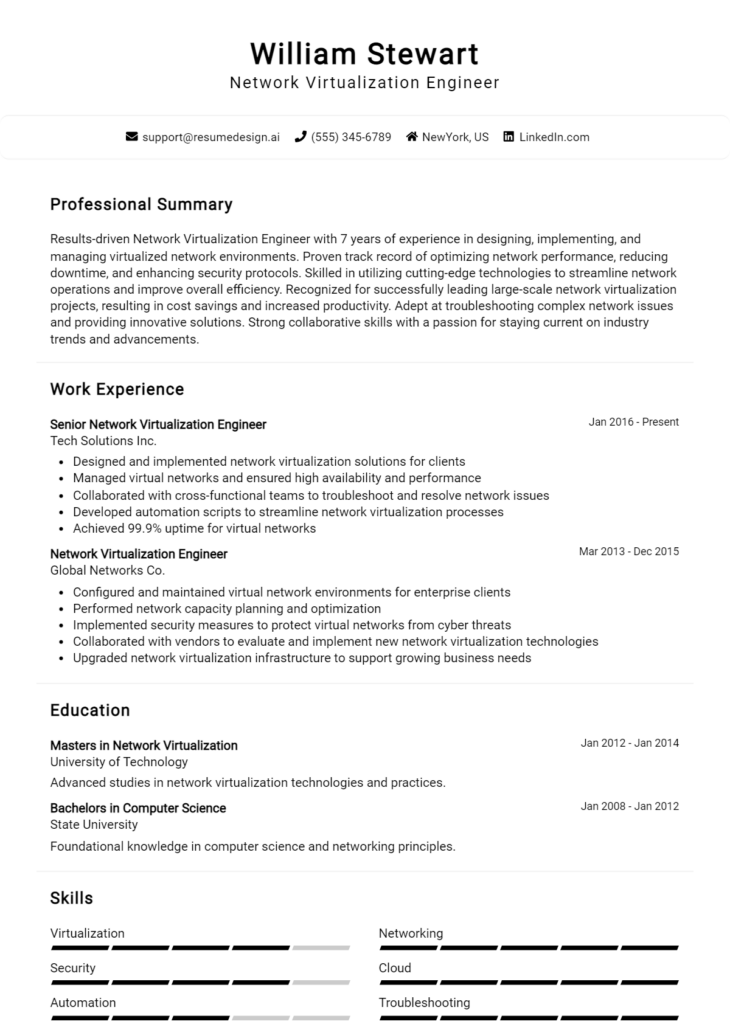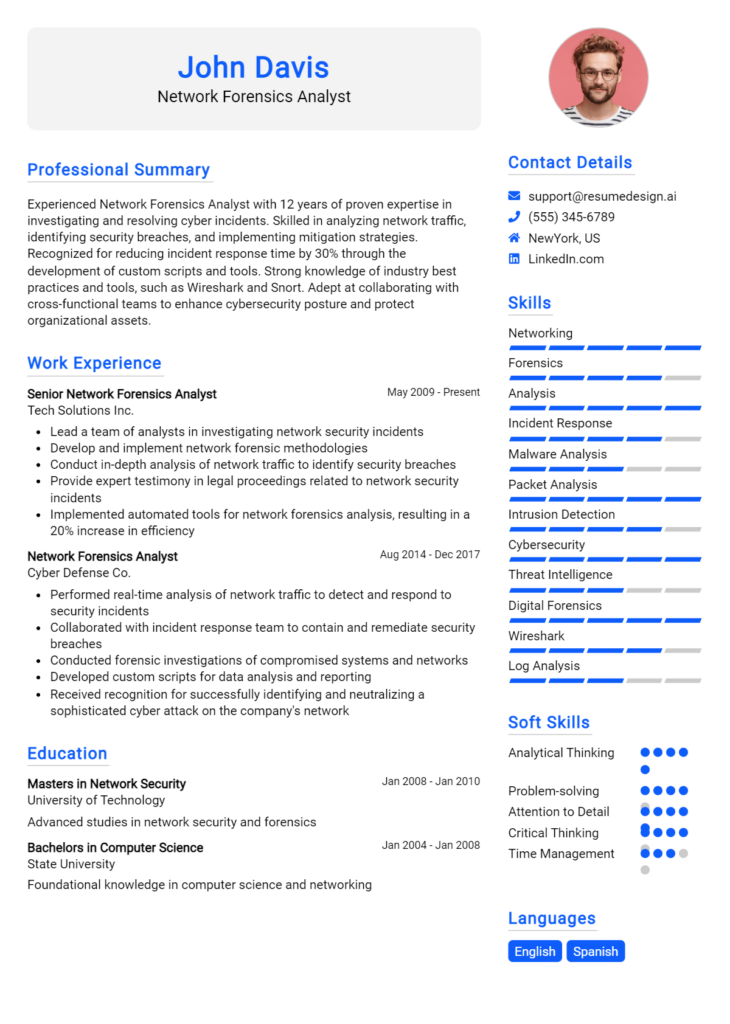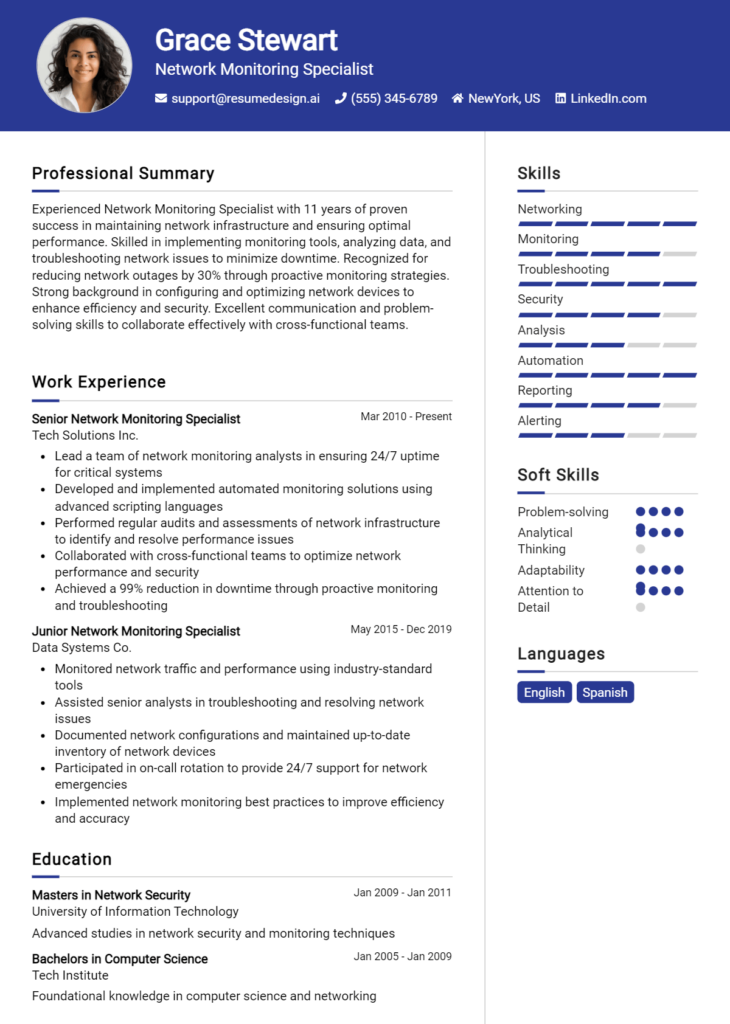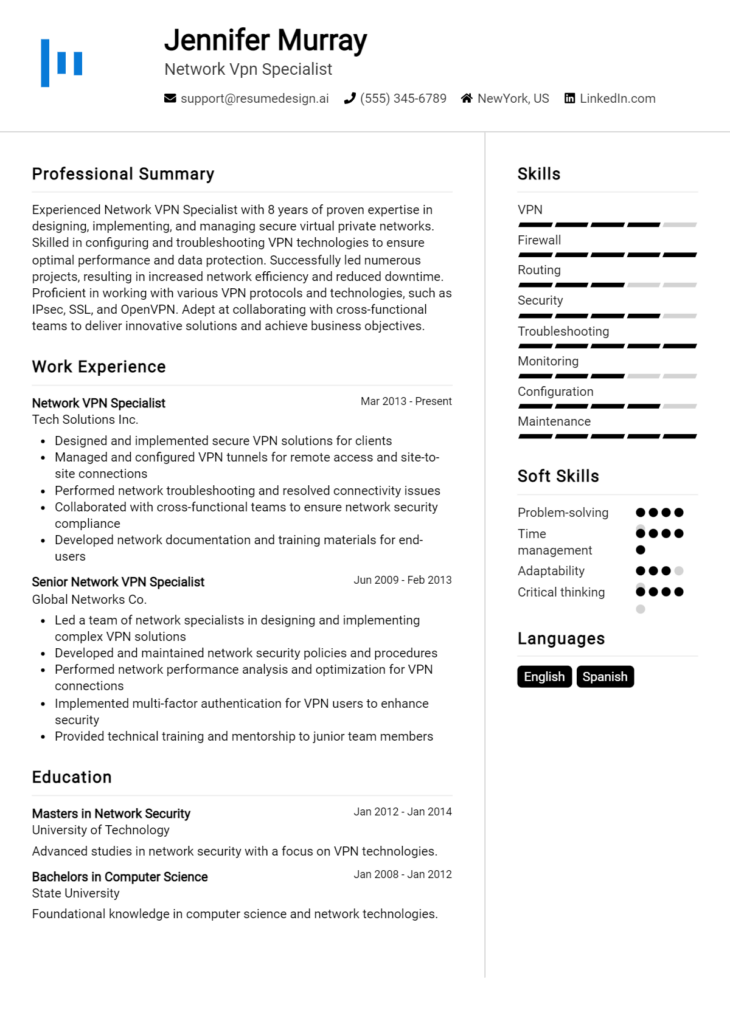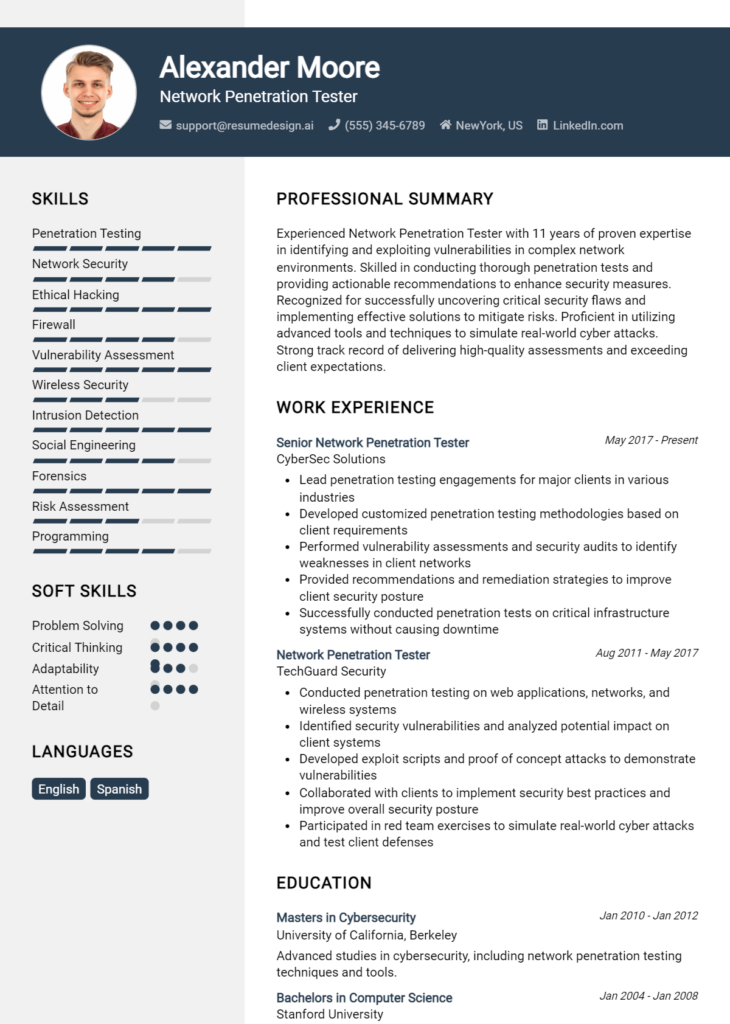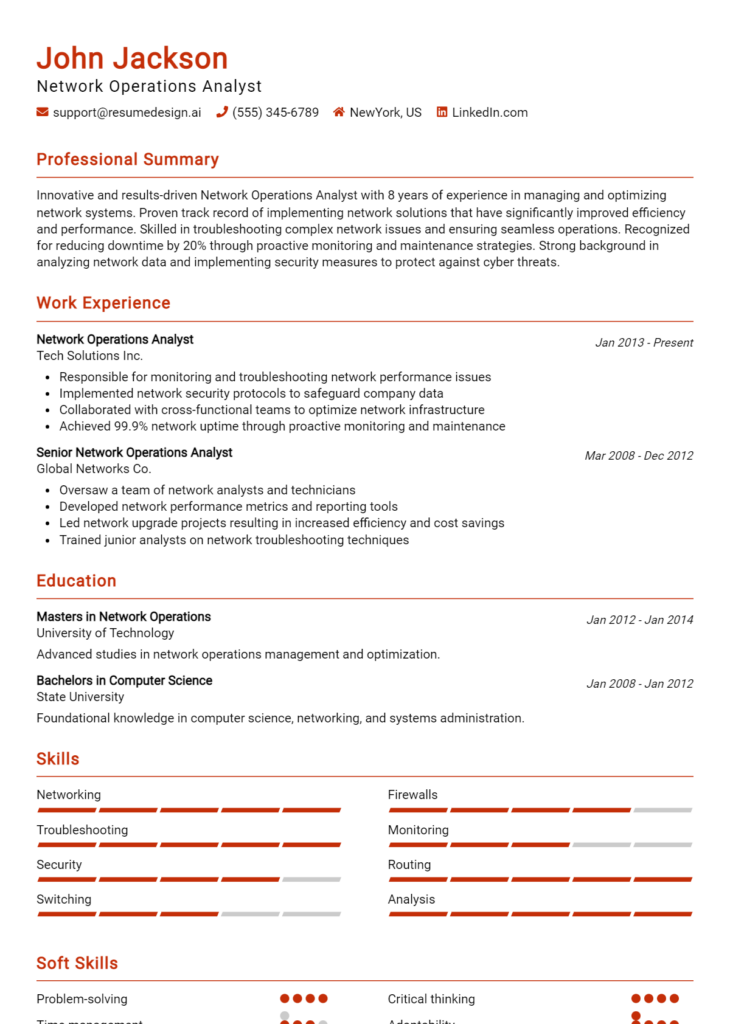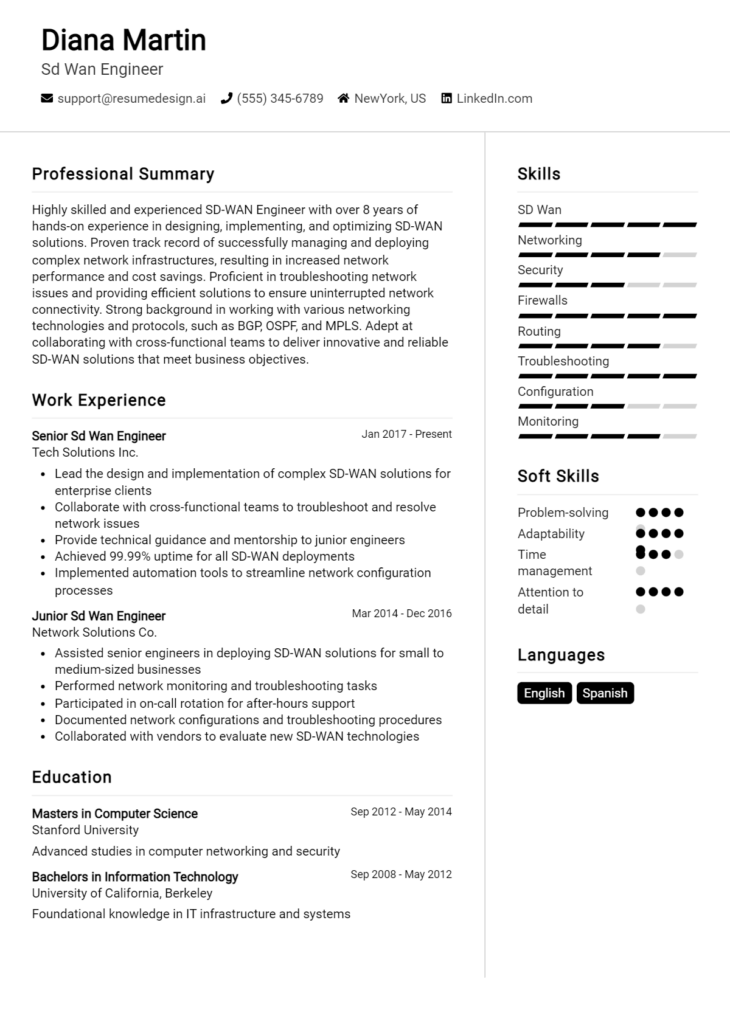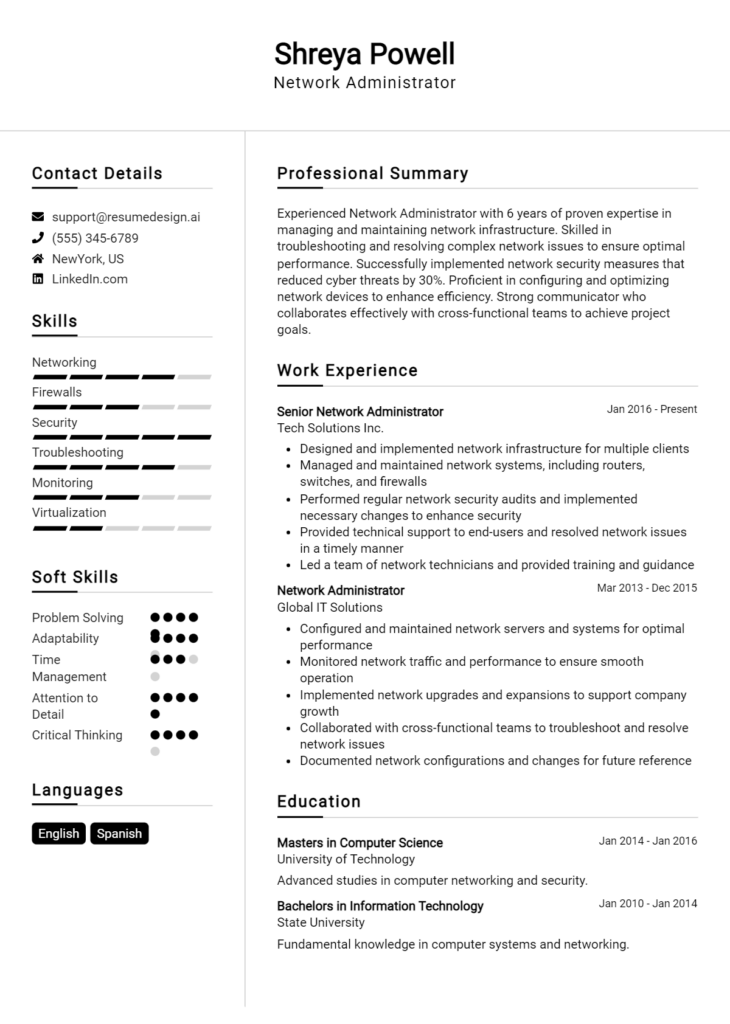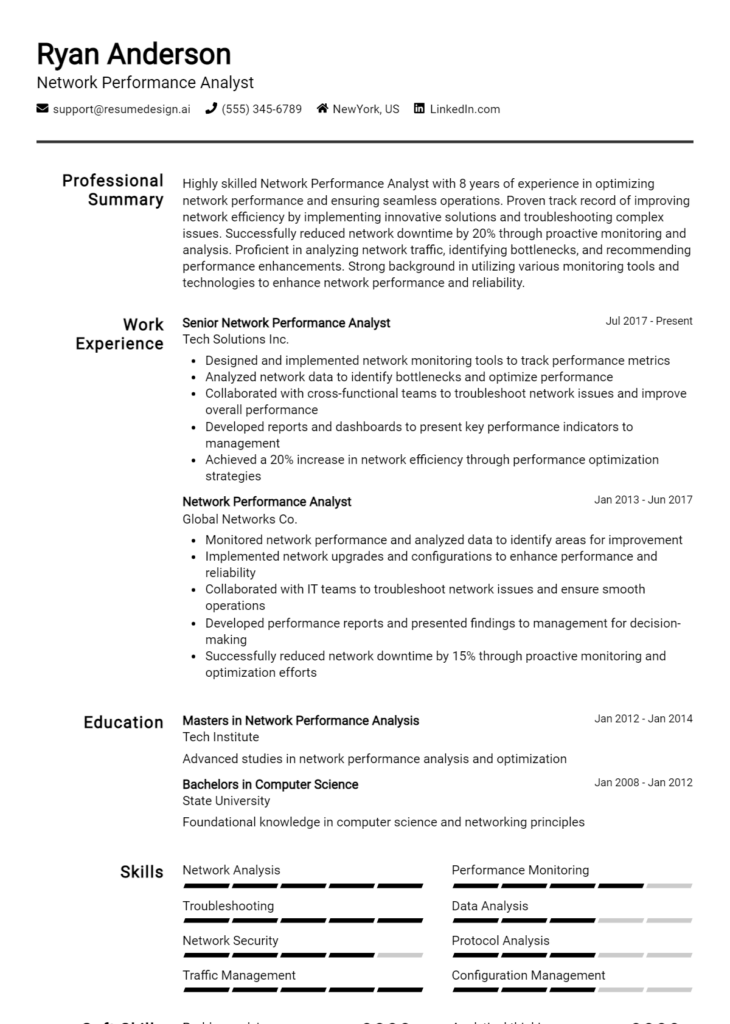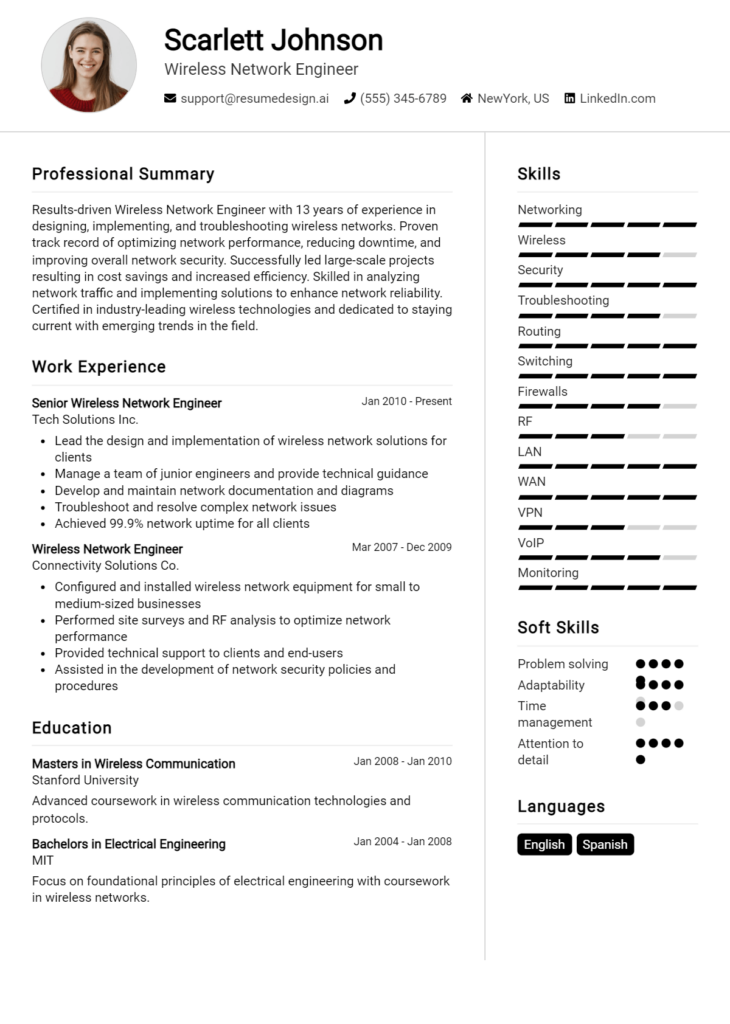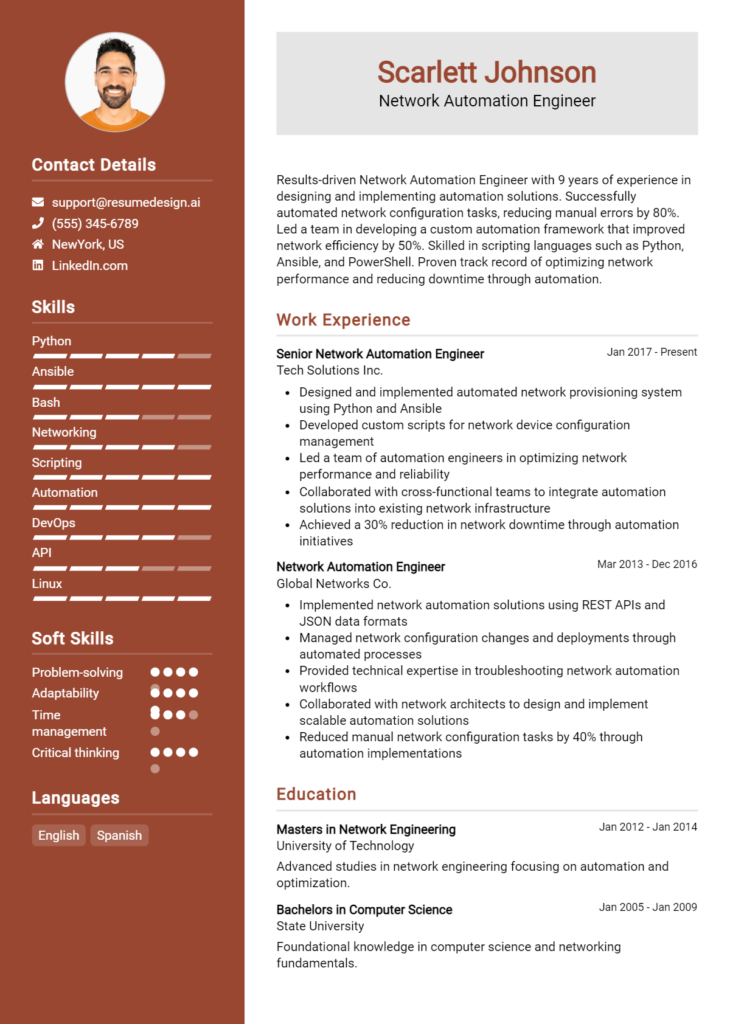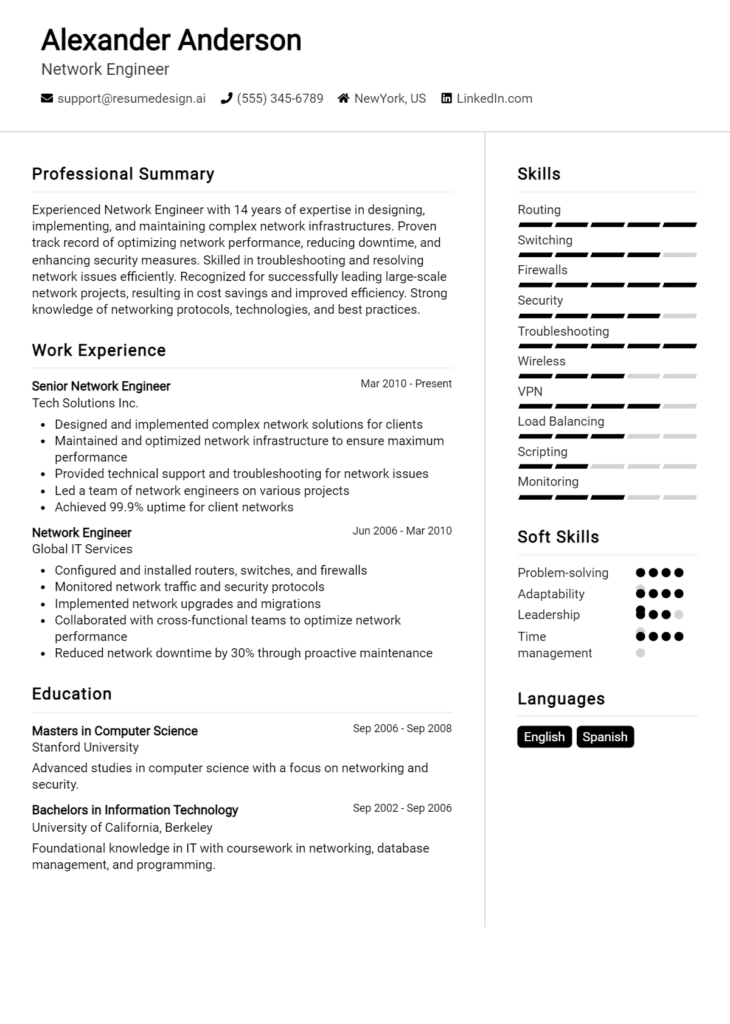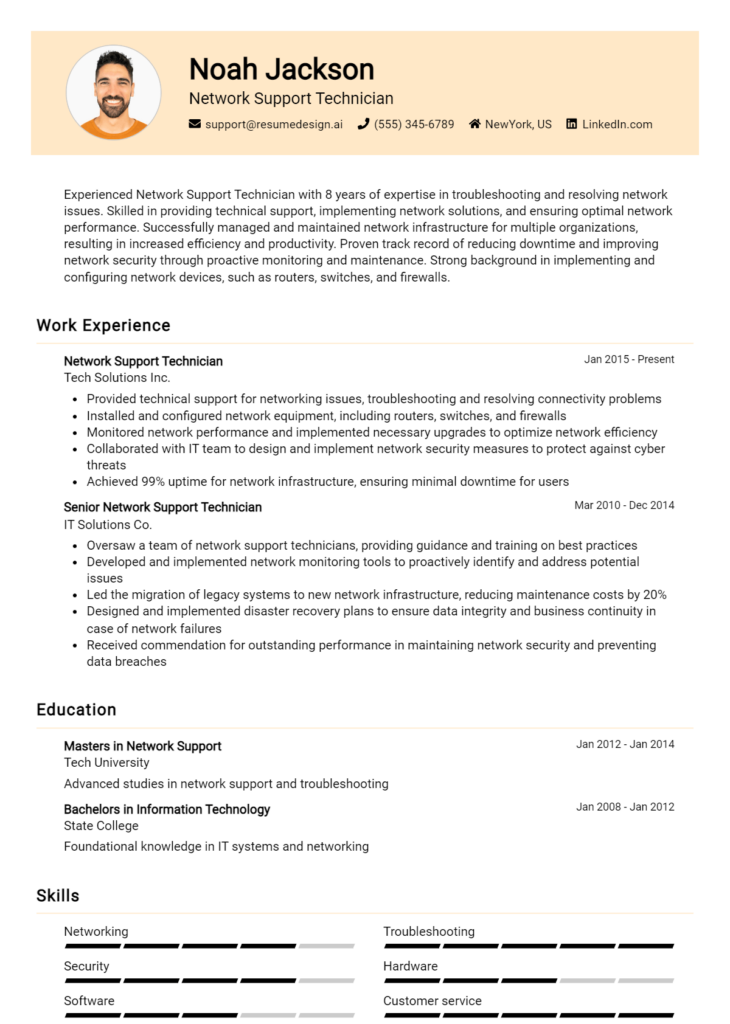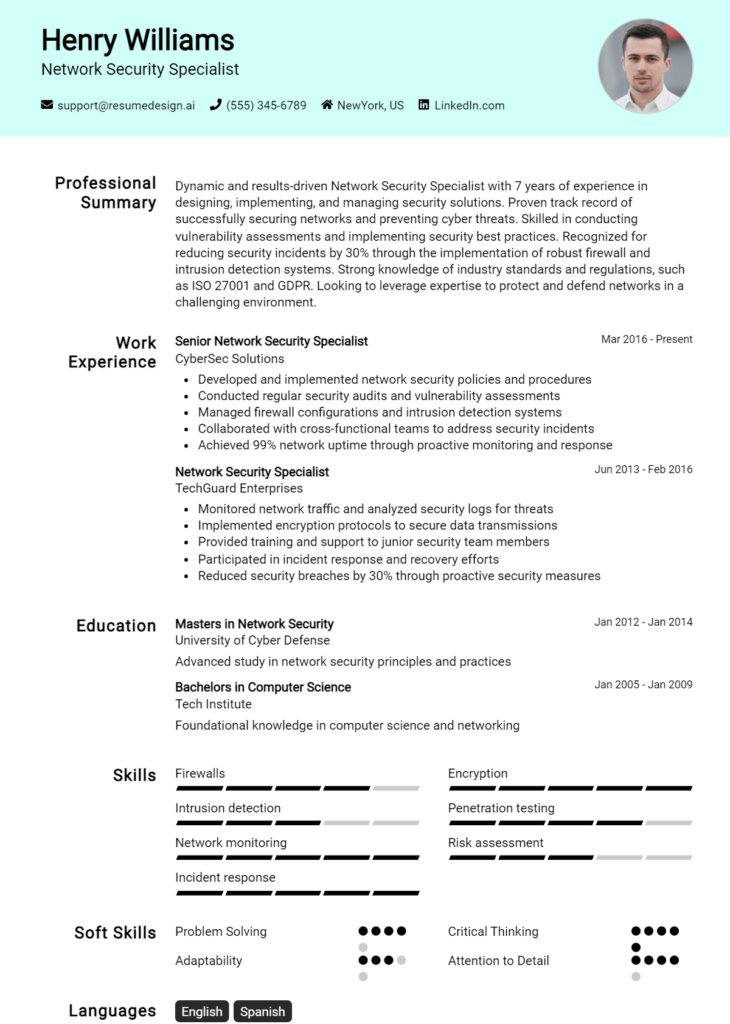Network Capacity Planner Core Responsibilities
A Network Capacity Planner is essential in ensuring that an organization’s network infrastructure meets current and future needs. This role requires strong analytical and problem-solving skills to assess network performance and forecast capacity requirements. The planner collaborates across departments to align technical capabilities with operational goals, ensuring seamless communication and resource allocation. Proficiency in data analysis and network modeling is crucial, as these skills contribute to strategic planning and operational efficiency. A well-crafted resume can effectively showcase these qualifications, emphasizing the candidate's ability to support organizational objectives.
Common Responsibilities Listed on Network Capacity Planner Resume
- Analyze network traffic patterns to forecast capacity needs.
- Collaborate with IT and engineering teams to design scalable network solutions.
- Develop and maintain network capacity planning models.
- Monitor network performance and identify potential bottlenecks.
- Conduct cost-benefit analysis for network upgrades and expansions.
- Prepare reports and presentations for management on capacity trends.
- Implement tools for network performance monitoring and reporting.
- Assess emerging technologies for potential integration into the network.
- Ensure compliance with industry standards and best practices.
- Manage vendor relationships related to network infrastructure.
- Provide recommendations for network optimization strategies.
High-Level Resume Tips for Network Capacity Planner Professionals
In today's competitive job market, a well-crafted resume is crucial for Network Capacity Planner professionals seeking to make a lasting impression on potential employers. As the first point of contact, your resume not only needs to effectively showcase your skills and achievements but also reflect your understanding of the industry's demands. A compelling resume can set you apart, highlighting your ability to optimize network resources, manage capacity planning, and contribute to organizational goals. This guide aims to provide practical and actionable resume tips specifically tailored for Network Capacity Planner professionals, ensuring you present your best self to prospective employers.
Top Resume Tips for Network Capacity Planner Professionals
- Tailor your resume to the job description by incorporating relevant keywords that align with the specific requirements of the position.
- Highlight your experience in capacity planning, including any methodologies or tools you've used to assess and optimize network performance.
- Quantify your achievements by using metrics, such as percentage improvements in network efficiency or reductions in costs due to effective capacity planning.
- Showcase your technical skills, such as familiarity with network monitoring tools, data analysis software, or specific technologies relevant to capacity planning.
- Include certifications related to network management or capacity planning, such as CCNP, CCIE, or other industry-recognized credentials.
- Demonstrate your problem-solving abilities by detailing specific challenges you’ve faced and the innovative solutions you implemented.
- Use clear, concise language and bullet points to improve readability and ensure your key qualifications stand out.
- Incorporate a professional summary at the top of your resume that succinctly captures your years of experience and core competencies in network capacity planning.
- Keep your resume updated with the latest technologies and trends in the networking field to show your commitment to professional development.
Implementing these tips can significantly enhance your chances of landing a job in the Network Capacity Planner field. A well-structured and tailored resume not only showcases your qualifications but also demonstrates your commitment to the role, making you a more attractive candidate to potential employers.
Why Resume Headlines & Titles are Important for Network Capacity Planner
In the competitive field of network capacity planning, a well-crafted resume headline or title can play a pivotal role in capturing the attention of hiring managers. These succinct phrases serve as the first impression of a candidate's qualifications and expertise, offering a quick yet impactful summary of their professional identity. A strong headline not only highlights a candidate's key skills and experiences but also aligns closely with the specific job being applied for. By being concise and relevant, a powerful resume title can effectively communicate the candidate's value proposition, making it easier for hiring managers to recognize their suitability for the role at a glance.
Best Practices for Crafting Resume Headlines for Network Capacity Planner
- Keep it concise: Aim for one impactful sentence or phrase.
- Be specific: Tailor the headline to reflect the role of a Network Capacity Planner.
- Highlight key skills: Incorporate relevant technical skills and competencies.
- Use action words: Start with dynamic verbs to convey proactivity.
- Quantify achievements: If possible, include metrics to showcase your impact.
- Reflect industry language: Use terminology that resonates within the network planning field.
- Stay relevant: Ensure the headline directly relates to the job description.
- Showcase unique strengths: Highlight what sets you apart from other candidates.
Example Resume Headlines for Network Capacity Planner
Strong Resume Headlines
"Results-Driven Network Capacity Planner with 10+ Years of Experience in Optimizing Network Performance"
“Expert Network Capacity Planner Specializing in Data Center Optimization and Efficiency Improvements”
“Dynamic Network Capacity Planner with Proven Track Record in Reducing Costs by 25% Through Strategic Planning”
Weak Resume Headlines
“Network Planner”
“Experienced Professional Seeking Opportunities”
The strong headlines are effective because they provide clear insights into the candidate’s experience, skills, and achievements, immediately demonstrating their value to potential employers. They are specific and action-oriented, which helps to create a compelling narrative around the candidate's professional identity. In contrast, the weak headlines fall flat due to their vagueness and lack of detail, failing to engage hiring managers or convey the candidate's unique qualifications. By avoiding generic titles and instead crafting impactful headlines, candidates can significantly enhance their chances of standing out in a crowded job market.
Writing an Exceptional Network Capacity Planner Resume Summary
A resume summary is a crucial component for a Network Capacity Planner, serving as a powerful introduction that can significantly influence a hiring manager's perception of a candidate. This brief overview allows candidates to succinctly highlight their key skills, relevant experience, and notable accomplishments, all tailored to the specific role for which they are applying. A strong summary should be concise and impactful, capturing the essence of the candidate's qualifications in a way that grabs attention and sets the stage for the details that follow in the resume.
Best Practices for Writing a Network Capacity Planner Resume Summary
- Quantify Achievements: Use specific numbers and metrics to showcase the impact of your work, such as bandwidth improvements or cost savings.
- Focus on Relevant Skills: Highlight skills that are directly applicable to network capacity planning, such as data analysis or network optimization techniques.
- Tailor for the Job Description: Customize your summary to align with the particular requirements and keywords found in the job posting.
- Keep it Concise: Aim for 3-4 sentences that effectively communicate your qualifications without overwhelming the reader.
- Showcase Industry Knowledge: Reference specific tools, technologies, or methodologies that are pertinent to the field of network capacity planning.
- Highlight Key Accomplishments: Mention any awards, recognitions, or significant projects that demonstrate your expertise and contributions to previous roles.
- Use Action-Oriented Language: Start sentences with strong action verbs to convey a sense of proactivity and effectiveness.
- Maintain Professional Tone: Ensure the language used is formal and indicative of a professional background in network planning.
Example Network Capacity Planner Resume Summaries
Strong Resume Summaries
Results-driven Network Capacity Planner with over 7 years of experience optimizing network infrastructure, leading to a 25% increase in capacity efficiency and a 15% reduction in operational costs. Proven expertise in utilizing advanced data analytics and predictive modeling tools to forecast bandwidth requirements and enhance overall network performance.
Detail-oriented Network Capacity Planner with a track record of successfully managing large-scale network projects, including a recent initiative that improved data flow by 30% across multiple regions. Skilled in collaborating with cross-functional teams to design and implement scalable network solutions that meet evolving business needs.
Dynamic Network Capacity Planner with expertise in assessing and planning network resources for high-demand environments. Achieved a 40% reduction in latency by implementing strategic upgrades and leveraging state-of-the-art capacity management tools. Dedicated to driving continuous improvement through data-driven decision-making.
Weak Resume Summaries
Network Capacity Planner with experience in network management. Looking for a new opportunity where I can use my skills.
Experienced in planning networks and working with teams. I want to help a company grow its network capacity.
The strong resume summaries are effective because they clearly articulate the candidate's accomplishments, highlight relevant skills, and include quantifiable outcomes that demonstrate their impact in previous roles. In contrast, the weak summaries lack specificity, fail to provide measurable results, and come across as generic, making them less compelling to hiring managers seeking qualified candidates for the Network Capacity Planner position.
Work Experience Section for Network Capacity Planner Resume
The work experience section of a Network Capacity Planner resume is a critical component that serves to illustrate the candidate's technical skills, leadership capabilities, and success in delivering high-quality network solutions. This section not only highlights the candidate's familiarity with industry standards and technologies but also emphasizes their ability to manage teams effectively and drive projects to completion. By quantifying achievements, such as improvements in network performance or capacity utilization, candidates can demonstrate their impact on organizational goals. Aligning experience with industry benchmarks ensures that the resume resonates with hiring managers looking for candidates who can make a tangible difference in their network operations.
Best Practices for Network Capacity Planner Work Experience
- Highlight relevant technical skills, such as proficiency in network analysis tools and capacity planning methodologies.
- Quantify achievements using metrics, such as percentage improvements in bandwidth utilization or reductions in downtime.
- Demonstrate leadership by showcasing team management experiences and the successful completion of collaborative projects.
- Align experiences with industry standards to ensure relevance and appeal to potential employers.
- Use action verbs to describe responsibilities and achievements, making the experience more impactful.
- Include specific technologies and platforms worked with to underline technical expertise.
- Focus on results-driven narratives that showcase problem-solving capabilities.
- Tailor the work experience section to reflect the job description and requirements of the role applied for.
Example Work Experiences for Network Capacity Planner
Strong Experiences
- Led a team of 5 network engineers to redesign the capacity planning process, resulting in a 30% increase in network performance and a 25% reduction in operational costs.
- Implemented advanced network monitoring tools that improved bandwidth utilization tracking by 40%, enabling proactive capacity management decisions.
- Collaborated with cross-functional teams to execute a major network upgrade, achieving a 99.9% uptime during peak traffic periods.
- Developed a comprehensive forecasting model that accurately predicted network demand, reducing over-provisioning costs by 15% annually.
Weak Experiences
- Worked on various network projects that involved planning and analysis.
- Assisted in tasks related to network capacity without specifying contributions or outcomes.
- Participated in team meetings to discuss network issues.
- Helped implement some network upgrades but did not track results or improvements.
The examples provided illustrate the stark contrast between strong and weak work experiences for a Network Capacity Planner. Strong experiences are characterized by clear, quantifiable outcomes, specific responsibilities, and a demonstration of technical leadership and collaboration. In contrast, weak experiences tend to be vague, lacking in measurable achievements and details that highlight the candidate's contributions. This difference is crucial for making a compelling case to potential employers about the candidate's qualifications and readiness for the role.
Education and Certifications Section for Network Capacity Planner Resume
The education and certifications section of a Network Capacity Planner resume is crucial for establishing the candidate's academic foundation and professional qualifications within the field. This segment not only showcases the applicant's relevant degrees and industry-recognized certifications but also underscores their commitment to continuous learning and skill enhancement. By including pertinent coursework and specialized training, candidates can significantly bolster their credibility and demonstrate a direct alignment with the requirements of the Network Capacity Planner role, making them more attractive to potential employers.
Best Practices for Network Capacity Planner Education and Certifications
- Include degrees in relevant fields such as Computer Science, Information Technology, or Network Engineering.
- List industry-recognized certifications like Cisco Certified Network Professional (CCNP) or Certified Information Systems Security Professional (CISSP).
- Highlight any coursework related to network design, capacity planning, or performance optimization.
- Emphasize ongoing education through workshops, webinars, or online courses in emerging technologies.
- Structure the section with the most relevant and recent qualifications at the top.
- Consider including honors or distinctions received during educational pursuits.
- Maintain clarity and conciseness to ensure easy readability for recruiters.
Example Education and Certifications for Network Capacity Planner
Strong Examples
- Bachelor of Science in Network Engineering, University of Technology, 2020
- Cisco Certified Network Professional (CCNP), 2021
- Mastering Network Capacity Planning and Performance Optimization, Online Course, 2022
- Certified Network Capacity Planner (CNCP), 2023
Weak Examples
- Bachelor of Arts in English Literature, University of Arts, 2018
- Certification in Basic Computer Skills, 2015
- High School Diploma, 2016
- Outdated Cisco Certified Network Associate (CCNA), 2017
The strong examples are considered effective because they directly relate to the skills and knowledge required for a Network Capacity Planner, showcasing both relevance and recency. In contrast, the weak examples reflect qualifications that are either irrelevant to the role or outdated, which could detract from the candidate's perceived suitability for the position. Highlighting strong educational and certification credentials is essential for making a compelling case to potential employers.
Top Skills & Keywords for Network Capacity Planner Resume
As a Network Capacity Planner, the importance of showcasing relevant skills on your resume cannot be overstated. These skills not only highlight your technical abilities but also demonstrate your capacity to effectively manage and optimize network resources. Crafting a resume that emphasizes both hard and soft skills will help potential employers understand your qualifications and how you can contribute to their organization. Focusing on the right mix of skills can set you apart in a competitive job market, ensuring that your resume resonates with hiring managers and aligns with the demands of the role.
Top Hard & Soft Skills for Network Capacity Planner
Soft Skills
- Analytical Thinking
- Problem-Solving
- Communication Skills
- Team Collaboration
- Project Management
- Adaptability
- Attention to Detail
- Time Management
- Critical Thinking
- Strategic Planning
Hard Skills
- Network Design and Architecture
- Capacity Analysis and Planning
- Traffic Forecasting
- Performance Monitoring Tools (e.g., SolarWinds, Nagios)
- Knowledge of Networking Protocols (e.g., TCP/IP, BGP)
- Data Analysis and Reporting
- Familiarity with Cloud Services (e.g., AWS, Azure)
- Understanding of Network Security Principles
- Experience with Network Simulation Tools
- Proficiency in Scripting Languages (e.g., Python, Bash)
By emphasizing a well-rounded skill set in both soft and hard categories, you enhance your resume skills and strengthen your candidacy for a Network Capacity Planner role. Additionally, including relevant work experience that showcases these skills can further illustrate your expertise and readiness for the challenges of the position.
Stand Out with a Winning Network Capacity Planner Cover Letter
As a dedicated professional with a robust background in network engineering and capacity planning, I am excited to apply for the Network Capacity Planner position at [Company Name]. My experience in analyzing network performance metrics and optimizing resource allocation aligns perfectly with the requirements of this role. I have a proven track record of designing scalable network solutions that not only meet current demands but also anticipate future growth, ensuring seamless connectivity and reliability for all users.
In my previous role at [Previous Company Name], I successfully led a team responsible for assessing network capacity and implementing strategies that reduced congestion by 30% over six months. By leveraging advanced analytical tools and collaborating with cross-functional teams, I was able to identify bottlenecks and propose actionable solutions that enhanced overall network efficiency. My ability to communicate complex technical information effectively to stakeholders has been pivotal in gaining buy-in for strategic initiatives and investments in network infrastructure.
I am particularly impressed by [Company Name]'s commitment to innovation and its proactive approach to network management. I am eager to contribute my expertise in capacity forecasting and demand analysis to help your organization stay ahead of network challenges. My strategic mindset, combined with hands-on experience in network optimization, will enable me to provide valuable insights that support [Company Name]'s goals and objectives.
Thank you for considering my application. I am looking forward to the opportunity to discuss how my skills and experiences can contribute to the success of your team. I am excited about the prospect of working at [Company Name] and am eager to bring my expertise in network capacity planning to help drive your organization forward.
Common Mistakes to Avoid in a Network Capacity Planner Resume
When crafting a resume for a Network Capacity Planner position, it's crucial to avoid certain pitfalls that can detract from your qualifications and experience. A well-constructed resume should effectively showcase your skills and accomplishments, but common mistakes can undermine your efforts. Below are some frequent missteps to watch out for when creating your resume:
Vague Job Descriptions: Failing to provide specific details about past job roles can leave employers unclear about your experience. Use quantifiable metrics and clear examples to illustrate your achievements.
Ignoring Keywords: Many companies use Applicant Tracking Systems (ATS) to screen resumes. Not including relevant keywords from the job description can result in your resume being overlooked.
Overloading with Technical Jargon: While it's important to demonstrate your technical expertise, using excessive jargon can confuse hiring managers. Aim for clarity and balance technical terms with accessible language.
Lack of Tailoring: Submitting a generic resume for every application can be detrimental. Tailor your resume to highlight the skills and experiences that align directly with the specific requirements of each job.
Omitting Soft Skills: Network Capacity Planners require strong analytical and communication skills. Neglecting to mention these can give a skewed view of your capabilities. Be sure to incorporate soft skills alongside technical proficiencies.
Inconsistent Formatting: A cluttered or inconsistent format can make your resume hard to read. Use a clean, professional layout with consistent font sizes and styles to enhance readability.
Neglecting Achievements: Focusing solely on responsibilities rather than accomplishments can diminish the impact of your resume. Highlight key projects, contributions, and specific results to demonstrate your effectiveness.
Typos and Grammatical Errors: Simple mistakes can leave a negative impression and suggest a lack of attention to detail. Always proofread your resume thoroughly or consider asking someone else to review it before submission.
Conclusion
As we conclude our exploration of the Network Capacity Planner role, it's crucial to highlight the key responsibilities and skills that define this position. Network Capacity Planners play a vital role in ensuring that an organization’s network infrastructure can accommodate current and future demands. They analyze traffic patterns, forecast growth, and recommend hardware and software solutions to optimize performance. Effective communication and collaboration with cross-functional teams are essential, as well as a strong analytical mindset and proficiency in various network management tools.
Having a polished and tailored resume is essential for standing out in this competitive field. If you have recently updated your skills or gained new experiences, now is the perfect time to revisit your Network Capacity Planner resume. Make sure it reflects your capabilities and aligns with the requirements of the roles you are targeting.
To assist you in this process, consider utilizing the available resources that can enhance your job application. Explore our resume templates to find a format that suits your style. Our resume builder can help you create a professional resume effortlessly, while the resume examples provide inspiration and guidance on how to present your experience. Don’t forget to check out our cover letter templates to craft a compelling introduction to your resume.
Take action today—review and refine your Network Capacity Planner resume to ensure it showcases your expertise and positions you for the opportunities ahead!

